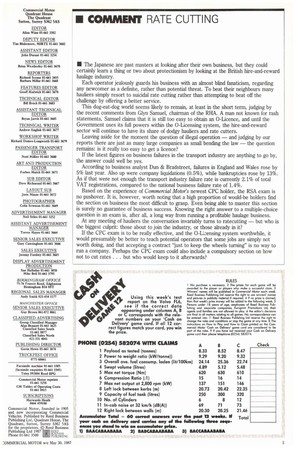• The Japanese are past masters at looking after their
Page 5

If you've noticed an error in this article please click here to report it so we can fix it.
own business, but they could certainly learn a thing or two about protectionism by looking at the British hire-and-reward haulage industry.
Each operator jealously guards his business with an almost blind fanaticism, regarding any newcomer as a definite, rather than potential threat. To beat their neighbours many hauliers simply resort to suicidal rate cutting rather than attempting to beat off the challenge by offering a better service.
This dog-eat-dog world seems likely to remain, at least in the short term, judging by the recent comments from Glyn Samuel, chairman of the RHA. A man not known for rash statements, Samuel claims that it is still too easy to obtain an 0-Licence, and until the Government uses its full powers within the 0-Licensing system, the hire-and-reward sector will continue to have its share of dodgy hauliers and rate cutters.
Leaving aside for the moment the question of illegal operation — and judging by our reports there are just as many large companies as small bending the law — the question remains: is it really too easy to get a licence?
If the latest figures on business failures in the transport industry are anything to go by, the answer could well be yes.
According to business analyst Dun & Bradstreet, failures in England and Wales rose by 5% last year. Also up were company liquidations (0.5%), while bankruptcies rose by 13%. As if that were not enough the transport industry failure rate is currently 2.1% of total VAT registrations, compared to the national business failure rate of 1.4%.
Based on the experience of Commercial Motor's newest CPC holder, the RSA exam is no pushover. It is, however, worth noting that a high proportion of would-be holders find the section on business the most difficult to grasp. Even being able to master this section is surely no guarantee of business success. Knowing the right answer to a multiple-choice question in an exam is, after all, a long way from running a profitable haulage business.
At any meeting of hauliers the conversation invariably turns to ratecutting — but who is the biggest culprit: those about to join the industry, or those already in it?
If the CPC exam is to be really effective, and the 0-Licensing system worthwhile, it would presumably be better to teach potential operators that some jobs are simply not worth doing, and that accepting a contract "just to keep the wheels turning" is no way to run a company. Perhaps the CPC exam could also include a compulsory section on how not to cut rates . . . but who would keep to it afterwards?












































































